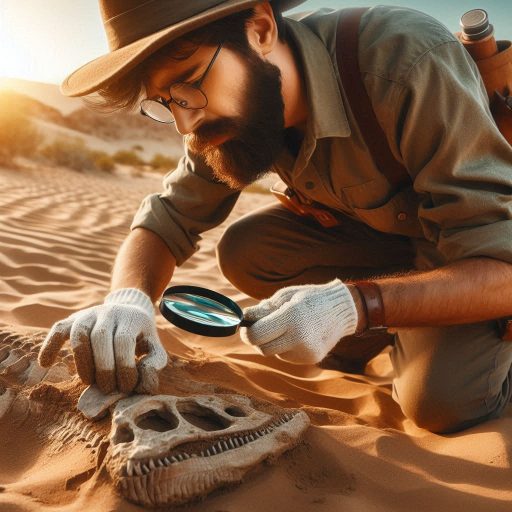Introduction
Paleontological excavations involve the careful extraction of fossils from the Earth‘s strata.
These digs provide invaluable insights into past life forms and ecosystems, allowing scientists to reconstruct ancient environments and understand evolutionary processes.
However, excavating fossils raises important ethical considerations that researchers must navigate.
Ethical practices ensure that scientific research benefits society while respecting the cultural and scientific significance of the finds.
Ethical considerations are crucial for maintaining integrity in paleontological research.
They guide how scientists conduct excavations, interact with local communities, and manage fossil collections.
Respecting indigenous rights and heritage is essential during excavations.
Researchers must recognize the cultural significance of fossil sites to local populations and ensure that their work does not harm these communities or their traditions.
Furthermore, issues of ownership and access to fossil findings are increasingly prominent in discussions about ethical practices.
Who owns the fossils, and how should they be distributed among researchers, institutions, and local communities? Establishing clear protocols regarding ownership can prevent conflicts and promote equitable sharing of knowledge and resources.
Respect for cultural heritage
Importance of Respecting the Cultural Significance of Fossil Sites
Paleontological excavations often uncover fossils that hold cultural significance for local communities.
Respecting this cultural heritage is essential for ethical excavations.
Many fossil sites are more than scientific resources; they are part of the history and identity of indigenous peoples.
Ignoring this connection can lead to the erasure of cultural narratives and practices.
Understanding the cultural context of fossil sites fosters respect and cooperation between scientists and local communities.
Paleontologists should engage with these communities to acknowledge their perspectives.
This collaboration can enrich scientific research and ensure ethical practices during excavations.
Respecting the cultural significance of fossils also promotes better relationships between researchers and local populations.
When scientists recognize the value of cultural heritage, they can create inclusive research environments.
Discussion on the Impact of Excavations on Indigenous Communities
Paleontological excavations can significantly impact indigenous communities.
These impacts can be both positive and negative.
On the positive side, excavations can bring attention to local heritage and promote educational opportunities.
They can also provide economic benefits through tourism and partnerships.
However, excavations can also lead to the exploitation of resources without local consent.
When paleontologists excavate sites without consulting indigenous communities, it can create feelings of disenfranchisement.
Communities may feel their cultural heritage is being commodified for scientific gain.
This perception can lead to mistrust and conflict between researchers and local populations.
Therefore, understanding these dynamics is crucial for ethical excavation practices.
Strategies for Involving Local Communities in Paleontological Excavations
Involving local communities in paleontological excavations is vital for ethical research.
Researchers should prioritize collaboration with indigenous groups from the project’s inception.
Establishing clear communication channels can help build trust and mutual respect.
Paleontologists can invite community members to participate in excavations and decision-making processes.
This involvement fosters a sense of ownership and empowerment among local populations.
Education plays a significant role in this collaboration.
Paleontologists can offer workshops to teach community members about paleontology.
These educational initiatives can enhance understanding and appreciation for the science behind excavations.
Furthermore, involving community members in research can provide valuable insights into local histories and perspectives.
Additionally, researchers should consider creating agreements with local communities.
These agreements can outline how fossil resources will be managed and shared.
By establishing clear guidelines, both parties can benefit from the partnership.
Researchers can gain valuable insights, while communities can ensure their cultural heritage is respected.
Therefore, ethical considerations in paleontological excavations are crucial for respecting cultural significance.
By understanding the impact on indigenous communities, paleontologists can foster positive relationships.
Implementing strategies that involve local communities will create more inclusive and ethical research practices.
Ultimately, this approach enhances both scientific understanding and cultural preservation.
Preservation of scientific integrity
Importance of Accurate Data Collection and Documentation
Accurate data collection and documentation are crucial in paleontological excavations.
These practices ensure that all findings are recorded systematically.
Detailed notes about the location, stratigraphy, and context of fossils are essential.
This information provides valuable insights into ancient ecosystems and their environments.
Without proper documentation, critical data can be lost or misinterpreted, compromising research integrity.
Proper data collection also enhances collaboration among scientists.
When researchers share accurate records, it fosters transparency in the scientific community.
Collaborative efforts lead to more comprehensive analyses and findings.
Furthermore, detailed documentation helps preserve the history of fossil discoveries.
It allows future researchers to revisit sites and build upon previous work.
Moreover, accurate data collection safeguards against claims of misconduct.
When scientists adhere to strict documentation protocols, they establish credibility in their findings.
This transparency is vital for gaining public trust in paleontological research.
Inaccurate data collection can lead to misinformation and misrepresentation of scientific discoveries.
Discussion on the Consequences of Unethical Practices in Paleontology
Unethical practices in paleontology can have severe consequences.
For instance, improper excavation methods may damage fossils and surrounding geological contexts.
This destruction can hinder future research efforts and erase valuable historical information.
Additionally, unethical behavior, such as poaching fossils, undermines the scientific community’s integrity.
Fossil poaching not only depletes our natural heritage but also creates legal and ethical dilemmas.
When fossils are illegally removed from their context, they lose their scientific value.
This practice disrupts the chain of information that helps researchers understand ancient life.
Furthermore, it diminishes the educational potential of fossils, denying future generations access to these treasures.
Unethical practices can also lead to public mistrust in scientific research.
When individuals or organizations prioritize profit over integrity, they tarnish the reputation of the entire field.
This loss of trust can result in reduced funding, collaboration, and public interest in paleontology.
Guidelines for Maintaining Scientific Integrity in Excavations
To maintain scientific integrity in excavations, researchers should follow established guidelines.
First, they must obtain the necessary permits and permissions for excavation.
Compliance with local and national regulations is crucial for ethical research.
Second, paleontologists should prioritize accurate data collection and documentation throughout the excavation process.
Keeping detailed field notes, photographs, and sketches helps preserve the context of fossil discoveries.
This documentation should include information about stratigraphy, surrounding materials, and any associated artifacts.
Third, collaboration with local communities is essential.
Engaging with indigenous groups and local stakeholders fosters mutual respect and promotes shared knowledge.
This collaboration helps ensure that excavations benefit everyone involved.
Finally, paleontologists should adhere to established codes of ethics set by professional organizations.
These codes outline best practices for responsible research and excavation.
By following these guidelines, scientists can contribute positively to the field of paleontology while preserving our planet’s rich fossil heritage.
Basically, ethical considerations in paleontological excavations are vital for maintaining scientific integrity.
Accurate data collection, the consequences of unethical practices, and adherence to established guidelines play crucial roles in this effort.
By prioritizing ethics, paleontologists can continue to advance our understanding of Earth’s history.
Read: Key Roles and Responsibilities of a Chemist in the US
Minimizing environmental impact
Importance of Preserving the Natural Environment During Excavations
Paleontological excavations provide valuable insights into Earth’s history.
However, they can also pose significant risks to the natural environment.
Preserving ecosystems during these excavations is crucial for maintaining biodiversity.
Paleontologists must recognize their responsibility to conduct research ethically and sustainably.
They need to balance scientific inquiry with environmental stewardship.
Excavations can disrupt habitats and alter landscapes.
Heavy machinery can compact soil and damage vegetation.
This disturbance can lead to erosion, habitat loss, and the decline of local species.
Furthermore, the removal of fossilized remains can upset delicate ecological balances.
These consequences highlight the need for careful planning and execution of excavation projects.
Discussion on the Potential Environmental Damage Caused by Paleontological Activities
Paleontological activities can cause various forms of environmental damage.
For example, large-scale excavations may disturb the soil and geological formations.
This disruption can lead to increased sediment runoff, affecting nearby water sources.
Additionally, the extraction of fossils can result in the destruction of important geological features.
Moreover, excavation activities can introduce pollutants into the environment.
Fuel spills, machinery emissions, and waste materials can contaminate soil and water.
These pollutants can harm local flora and fauna, disrupting ecosystems.
The potential for long-term environmental damage necessitates a thorough assessment before conducting excavations.
Strategies for Minimizing the Ecological Footprint of Excavations
To minimize the ecological footprint of paleontological excavations, researchers can implement several strategies.
First, they should conduct environmental impact assessments before starting any project.
These assessments can identify potential risks and inform mitigation strategies.
Understanding the local ecosystem is essential for protecting it during excavations.
Second, paleontologists should adopt sustainable excavation methods.
Using hand tools instead of heavy machinery can reduce soil compaction and minimize habitat disruption.
When heavy equipment is necessary, operators should follow best practices to limit environmental impact.
For instance, they can restrict vehicle access to designated pathways.
Third, paleontologists can implement habitat restoration plans.
After excavations, they should restore disturbed areas to their natural state.
This process may involve replanting native vegetation, removing debris, and monitoring ecological recovery.
Engaging with local communities and conservation groups can enhance these restoration efforts.
Finally, researchers should prioritize education and outreach.
By raising awareness about the importance of environmental preservation, they can foster a culture of sustainability within the scientific community.
Collaboration with environmental organizations can also promote best practices for responsible excavations.
In essence, ethical paleontological excavations require a commitment to preserving the natural environment.
Understanding the potential environmental damage caused by these activities is vital.
By implementing effective strategies, paleontologists can minimize their ecological footprint and protect fragile ecosystems.
Ultimately, responsible excavations contribute to both scientific knowledge and environmental stewardship.
Read: Essential Skills and Tools for Modern Chemists in America
Proper handling and care of fossils
Importance of Proper Handling, Storage, and Transportation of Fossils
Proper handling, storage, and transportation of fossils are crucial in paleontological excavations.
Fossils represent millions of years of Earth’s history and hold immense scientific value.
Mishandling can lead to irreversible damage or loss of these irreplaceable specimens.
Therefore, every step in the process requires careful attention to detail.
During excavation, researchers must use appropriate tools and techniques to extract fossils.
Using brushes, small picks, and other delicate instruments minimizes the risk of breakage.
Team members should work slowly and communicate effectively to ensure everyone is aware of the fossil’s condition.
Proper training in excavation methods can significantly reduce the chances of accidents.
Once fossils are extracted, immediate stabilization is essential.
Applying consolidants can help prevent cracking and deterioration.
Researchers should wrap specimens in soft, protective materials, such as foam or cotton, before transporting them.
Using sturdy containers also provides extra security during transit.
Storage conditions play a vital role in the preservation of fossils.
Researchers should store fossils in climate-controlled environments to avoid exposure to moisture and extreme temperatures.
Ideally, storage areas should be dark to prevent light damage.
Clear labeling of specimens helps ensure they can be easily identified and retrieved without unnecessary handling.
Discussion on the Risks of Damage or Loss of Important Specimens
The risks associated with improper handling and storage of fossils are significant.
A lack of attention can lead to irreparable damage, such as fractures or fragmentation.
Furthermore, essential specimens may be lost entirely if not documented correctly during excavations.
This loss can hinder scientific research and limit our understanding of ancient life.
Inadequate transportation methods pose additional risks.
If fossils are not securely packed, they may shift during transit, leading to potential damage.
Unexpected impacts or jostling can fracture delicate specimens, rendering them useless for study.
The consequences of such losses extend beyond individual fossils; they can impact entire research projects and the knowledge derived from them.
Guidelines for Ensuring the Safety and Preservation of Fossils During Excavations
To mitigate these risks, paleontologists should follow established guidelines for fossil handling and preservation.
First, all team members should undergo training in proper excavation techniques.
This training should cover everything from tool selection to specimen stabilization.
Next, teams should develop a detailed excavation plan.
This plan should outline specific protocols for handling, transporting, and storing fossils.
Regular meetings can help ensure everyone understands their roles and responsibilities.
Consistent communication throughout the excavation process fosters teamwork and vigilance.
Additionally, researchers should document every specimen meticulously.
Detailed notes, photographs, and GPS data provide critical context for each fossil’s origin.
This information not only aids in future research but also helps track the chain of custody for each specimen.
Finally, investing in high-quality transportation and storage materials is essential.
Using specially designed containers can minimize risks during transit.
Fossils should be placed in padded cases or boxes with appropriate cushioning to ensure their safety.
By adhering to these guidelines, paleontologists can protect valuable specimens and ensure their contributions to science endure for generations.
A commitment to ethical excavation practices fosters a responsible approach to paleontological research.
This dedication ultimately enriches our understanding of Earth‘s biological history.
Read: The Role of Chemists in US Environmental and Sustainability Efforts

Gain More Insights: Top Conferences and Events for Hydrologists
Ethical use of technology
When conducting paleontological excavations, it is crucial to consider the ethical implications of using technology.
By leveraging technological advancements, researchers can significantly enhance their ability to study fossils and ancient organisms.
However, it is essential to use these tools responsibly and ethically to avoid potential negative consequences.
Importance of Using Technology Ethically
Technology plays a vital role in modern paleontological research, enabling scientists to gather data more efficiently and accurately.
From drones for aerial surveys to 3D printing for creating replicas of fossils, these tools have revolutionized the field.
However, with great power comes great responsibility, and it is crucial for researchers to use technology ethically.
Ethical Implications of Using Drones and 3D Printing
When using drones in paleontological excavations, researchers must consider the potential impacts on local ecosystems and wildlife.
Improper use of drones can disturb animals, damage habitats, or violate privacy rights.
Similarly, the use of 3D printing technology raises ethical concerns, particularly regarding the replication and distribution of rare or culturally sensitive fossils.
Researchers must ensure that their use of these tools is respectful and in compliance with local regulations.
Transform Your Career Today
Unlock a personalized career strategy that drives real results. Get tailored advice and a roadmap designed just for you.
Start NowGuidelines for Responsible Use of Technology in Fossil Research
- Obtain all necessary permits and permissions before using drones or 3D printing technology in the field.
- Respect local regulations and guidelines related to the use of technology in paleontological excavations.
- Minimize the environmental impact of using drones by following best practices for aerial surveys.
- Securely store and protect any data or replicas created using 3D printing technology to prevent unauthorized use or distribution.
- Consider the ethical implications of replicating rare or culturally significant fossils using 3D printing technology.
- Engage with local communities and stakeholders to discuss the ethical considerations of using technology in paleontological research.
- Prioritize the conservation and protection of fossils and ancient artifacts when using drones or 3D printing technology in the field.
- Regularly review and update ethical guidelines for the use of technology in paleontological excavations to ensure compliance with evolving standards.
By following these guidelines, researchers can conduct their work responsibly in paleontological excavations.
They can contribute to advancing scientific knowledge while respecting the communities impacted by their work.
Additionally, researchers must consider the ethical implications of using technology.
This approach ensures they honor both the past and present.
Read: Day in the Life: An Environmental Scientist‘s Typical Day
Collaboration and sharing of findings
Importance of Collaboration and Information Sharing in Paleontology
Collaboration and information sharing are vital in paleontology.
Scientists often work together to enhance research quality and outcomes.
Sharing data, findings, and resources promotes a comprehensive understanding of fossil discoveries.
This teamwork can lead to groundbreaking insights about ancient life and ecosystems.
Moreover, collaboration fosters a culture of mutual respect and ethical responsibility.
When paleontologists collaborate, they create a platform for diverse perspectives.
Different experts bring unique skills and knowledge, enriching the research process.
For instance, geologists can provide insights into the geological context of fossils.
Meanwhile, biologists can analyze the evolutionary significance of these finds.
This interdisciplinary approach ensures that paleontological studies are thorough and well-rounded.
Discussion on the Benefits of Open Access to Research Findings
Open access to research findings is another critical aspect of ethical paleontology.
When researchers share their results freely, it benefits the entire scientific community.
Open access allows other scientists to build upon existing work, driving further discoveries.
This transparency encourages innovation and reduces redundancy in research efforts.
Moreover, open access supports education and public engagement.
Students and educators can access valuable resources without financial barriers.
This accessibility inspires the next generation of paleontologists and promotes a broader understanding of science.
Additionally, it allows the public to appreciate the significance of paleontological research.
The global nature of paleontology means that discoveries in one part of the world can benefit researchers elsewhere.
Open access facilitates international collaboration and enhances cross-border partnerships.
By sharing findings, scientists can work together to address global challenges, such as climate change and biodiversity loss.
Strategies for Promoting Collaboration and Transparency in the Field
To promote collaboration and transparency in paleontology, several strategies can be implemented.
First, establishing online platforms for data sharing can facilitate easier access to research findings.
These platforms can host databases of fossil records, excavation sites, and research articles.
Such resources would benefit both established scientists and newcomers to the field.
Second, organizing workshops and conferences encourages networking and collaboration.
These events provide opportunities for researchers to discuss their work and share ideas.
Additionally, they foster partnerships that can lead to joint projects and interdisciplinary studies.
Third, educational institutions should prioritize collaboration in their curricula.
By encouraging students to work together on research projects, they develop essential teamwork skills.
This emphasis on collaboration prepares future paleontologists for a field that thrives on cooperation.
Lastly, funding agencies should support collaborative projects and open access initiatives.
By prioritizing these efforts, they ensure that paleontology remains a transparent and inclusive field.
This funding can also help cover the costs associated with making research publicly accessible.
Generally, collaboration and information sharing are crucial in paleontology.
Open access to research findings promotes innovation and public engagement.
By implementing strategies that encourage collaboration and transparency, the field can continue to advance ethically and responsibly.
Conclusion
Ethical considerations in paleontological excavations are crucial for conducting responsible research.
Researchers must prioritize the preservation of fossil sites, ensuring that they remain undisturbed for future study.
Respecting land ownership and the rights of local communities is also essential.
Collaboration with these communities enhances understanding and fosters goodwill, creating a cooperative environment for excavation efforts.
Transparency in documenting findings is vital for maintaining scientific integrity.
Researchers must accurately report their methods, results, and the context of their discoveries.
This openness allows others in the field to replicate studies and build on the work done.
Additionally, researchers should be mindful of how excavation methods impact the environment.
Using techniques that minimize ecological disruption is not only ethical but also responsible.
It is imperative for paleontologists to prioritize ethical practices in their work.
Upholding these standards safeguards the integrity of scientific research and promotes public trust in the field.
Researchers should actively engage in discussions about ethical dilemmas, sharing best practices and experiences within the paleontological community.
Regular workshops, seminars, and conferences can serve as platforms for these discussions.
[E-Books for Sale]
The Big Book of 500 High-Paying Jobs in America: Unlock Your Earning Potential
$19.99 • 500 High-Paying Jobs • 330 pages
Explore 500 high-paying jobs in America and learn how to boost your career, earn more, and achieve success!
See All 500 High-Paying Jobs of this E-Book
1001 Professions Without a Degree: High-Paying American Jobs You Can Start Now
$19.99 • 1001 Professions Without a Degree • 174 pages
Discover 1001 high-paying jobs without a degree! Unlock career tips, skills, and success strategies for just $19.99!




